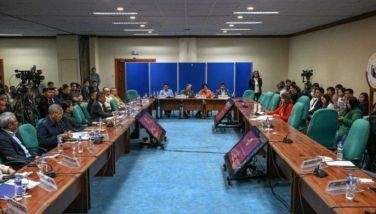Keeping the rules the same

When public interest is involved, the State can use its police powers to suspend operations of any erring public utilities and transport. And that was exactly what the Civil Aviation Authority of the Philippines (CAAP) did when it suspended the flight services of budget airline Zest Airways Inc. last week due to safety concerns.
Yesterday, ZestAir planes were back in service again obviously after they complied with safety standards to the satisfaction of CAAP inspectors. The suspension order effectively grounded ZestAir planes for three days.
In particular, the CAAP’s Flight Standards Inspectorate Service (FSIS) airworthiness inspectors cleared three aircraft of ZestAir to resume transport services while its eight other aircraft are being inspected as of press time.
The low cost carrier was placed under heightened surveillance last July 31 due to the cancellation of several of its domestic and international flights last month. The airline reportedly lost at least P70 million worth of revenues every day that it was suspended.
ZestAir is controlled by AMCY Holdings headed by its president and chief executive officer Ambassador Alfredo Yao. He presented to CAAP deputy director general John Andrews the compliance of ZestAir to lift the suspension of the Airline Operator’s Certificate (AOC). All’s well that ends well.
As a layman, my understanding of having laws to govern the nation is to put order on things we should and not do to prevent misunderstanding, chaos and worst, anarchy.
One then wonders why lawyers and even magistrates spend lengthy and heated debates before the bar on how a particular law should be interpreted. Often at stake are lives, properties and dreams of people facing court judgment. A wrong verdict could ruin an otherwise fruitful existence.
This is why I was not surprised at the reaction of the freight forwarding industry when Federal Express Pacific Inc. (or FedEx for short), one of its largest members, was told by the Court of Appeals (CA) to pack up because it is foreign-owned and its business exclusively for Filipinos.
The industry understandably roared in disapproval with the CA ruling because several other foreign forwarders operating in the Philippines for years are going to be affected.
The fourth division of the appellate court last July 21 voided the permit granted in 2011 by the Civil Aeronautics Board (CAB) to FedEx. The CA ruled with finality that FedEx’s operations in the country violate the constitutional ban on foreign ownership of firms delivering public utility services.
The CA cited Article XII Section 11 of the Constitution, which provides that “operation of a public utility shall be granted to Filipino citizens or to corporations or associations organized under the laws of the Philippines.â€
In effect, the CA ruled in favor of petitions filed by Merit Freight International Inc. and Ace Logistics Inc. that questioned CAB’s decision to grant FedEx a regular permit to operate international airfreight forwarding. Merit argued that international airfreight forwarding is a public utility reserved for qualified Filipino individuals and corporations as embodied in the country’s 1987 Constitution.
Only a few years ago, Philippine government officials led no less by former President Fidel Ramos and then Subic Bay Metropolitan Authority chairman Richard Gordon were the principal drumbeaters that brought FedEx to set up their hub of operations here in the Philippines.
It was upon the Philippine government’s invitation FedEx decided to put up their Asia-Pacific hub at Subic in 1995. For long while, FedEx used the Subic Freeport international airport until they decided in February 2009 to transfer hub to Guangzhou, China.
FedEx and other freight forwarders have been licensed to operate in the Philippines for years because they raise the efficiency of Filipino freight forwarders. FedEx like the rest pays license fees and taxes. The industry creates a lot of jobs.
One industry analyst, Eagle Securities president Joey Roxas publicly issued a statement to caution the CA about the impact of its judicial appreciation of facts. A seasoned veteran, Roxas knows all too well that the decision could have a negative impact on the economy itself. Freight forwarding is the flywheel of business. Breaking that cog is economic suicide!
The CA made the ruling at the will of two Filipino firms.
How is public interest served here when the petition was obviously initiated by bitter competitors using our courts’ relief to bulldoze their rival into submission?
However – and this is the part that makes everything fuzzy – the law also says that this rule on nationality does not apply to public utilities engaged exclusively in international commerce. Therefore, foreigners can own and operate air and sea carriers engaged exclusively in the foreign transport of passengers or goods or both, to and from Philippine airports and seaports.
The industry fears that the CA decision is putting at risk the licenses of more than a dozen international airfreight forwarding firms in the Philippines. These are: UPS, DHL, FedEx, TNT, Ecu Line, Expeditors, Kintetsu, Konoike, Logwin Air, MIQ Logistics, Mitsui-Soko, Nippon Express, NNR Global Logistics, and Scan Global Logistics, just to name some of these firms.
Thus, Roxas argued: “What the business community needs most of all are a level playing field and clear rules that do not change every so often.â€
Makati Business Club chairman Ramon del Rosario expressed the same sentiments. Del Rosario noted the CA ruling barring FedEx from doing business in the country was “most unfortunate as it again illustrates the lack of stability and predictability in our economic policy environment.â€
Despite this setback, FedEx is continuing with its operations here while waiting for the Supreme Court to rule on their motion for reconsideration on the CA decision.
In the meantime, the rules of the game ought to remain the same for all.
- Latest
- Trending




























